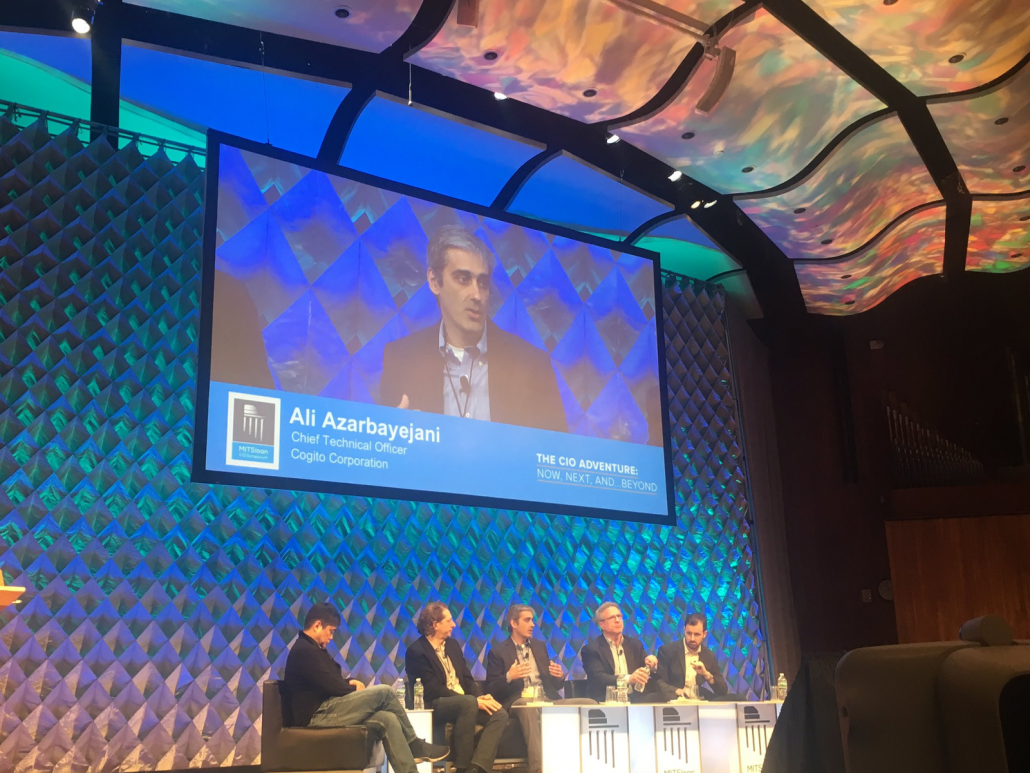Cogito Blog
Putting AI to Work: MIT’s CIO Symposium
Earlier this spring, hundreds of CIOs, business leaders, academics and technologists gathered in Cambridge, Massachusetts – often known as the most innovative square mile in the world – for the 2017 MIT Sloan CIO Symposium. They came to discuss the deep effects of digital transformation on the global economy, the future of work and issues related to talent, artificial intelligence, cloud strategies, and security.
Cogito’s CTO Ali Azarbayejani participated in a panel discussion entitled, “Putting AI to Work “, centered on AI technologies’ impact on the enterprise and workplace. Ali was joined by panelists Seth Earley, CEO of Earley Information Science, Ryan Gariepy, CTO & Co-founder of Clearpath and Otto Motors and Professor Josh Tenenbaum of The Department of Brain and Cognitive Sciences at MIT. The panel was moderated by Professor Joi Ito, Director of the MIT Media Lab. The dynamic and diverse group of industry experts explored the new opportunities and possibilities being introduced by AI-driven products, examining how these advancements are changing how we interact with the world and in the workplace.

The big takeaway and consistent theme: Augmented Human Intelligence.
One of the biggest questions that came up during the panel was whether AI and machine learning will replace human workers. The consensus was that while advancements in artificial intelligence will inevitably replace some job functions, it will not lead to the massive takeover many are fearing – at least in our immediate future. Instead, there will be a focus on developing machine capabilities that augment human behavior and help people to work/live better, smarter, and more efficiently.
Currently there are a number of examples where AI is helping to improve employee productivity and enhance human skills. For example, at Cogito our software can evaluate hundreds of behavioral signals through live voice conversations and provide real-time coaching to agents helping them to communicate more effectively. This real-time feedback helps agents build better rapport with customers and increase their productivity. It ensures callers are treated to top-notch customer service making them happier and more loyal to a brand.
Delivering on the promise of specialized AI in the workplace is easier said than done for many businesses today. Moderator Joi Ito noted that one of the key challenges as we integrate applications of AI in the enterprise is that CIOs still face problems finding adequate talent to build, train and manage these highly complex technology systems. Finding ways to bridge the skills gap will be critical for CIOs if they want to keep up with the pace of innovation. Professor Tenenbaum suggested a possible solution would be to a rethink our education system, shifting from a model where young people go to school to prepare for a lifelong career to an educational approach that is focused on lifelong learning and re-training as the job market continually shifts.
A quote that left a lasting impression from the session was from Cogito’s CTO Ali Azarbayejani,
“True, “generalized” AI is still far from reality. Instead, machine learning and other AI technologies are best leveraged as “augmentative intelligence.” AI is best leveraged at this point to augment and support human understanding—helping to make people their best selves—instead of trying to replace humans altogether.
For more on what you may have missed from the AI panel and other key takeaways from this year’s MIT Sloan CIO Symposium be sure to visit some of the links below:
- 2017 MIT CIO Symposium in photos: A SearchCIO snapshot
- CIOs Hold Out Hope for Humans as Automation Powers More IT Processes
- 6 reality checks for IT chiefs: MIT Sloan CIO Symposium
- Why AI will force businesses to rethink balance between the work of humans and machines
- Machine learning systems are a ‘land rush’ of opportunity for CIOs